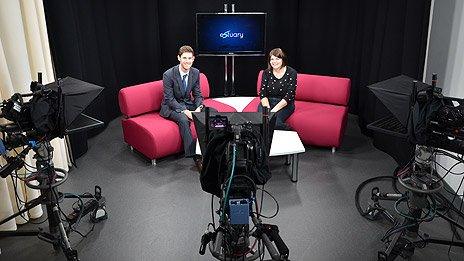Local TV revolution begins in Grimsby
- Published
David Sillito went behind the scenes at Estuary TV's studios ahead of the big launch, and spoke to news editor Emma Lingard and presenter Martin Samuels
A new breed of TV stations launches on Tuesday, when the first of almost 50 local channels goes on air. This broadcasting revolution is beginning in Grimsby with the launch of a station airing local news, sport and philosophy.
In an office in the old media department of a Grimsby college, Estuary TV controller Lia Nici is playing a clip of the channel's sports discussion programme On the Bench.
It starts with a pre-recorded interview with football legend Kevin Keegan, who began his career at nearby Scunthorpe United, followed by discussions on smart sofas (not a bench) about the week's big match - the FA Cup tie between Scunthorpe and Grimsby Town.
The whooshy graphics would not be out of place on Sky Sports and the two hosts are both highly impressive.
"It's not terrible TV," Nici laughs. "It's not wobbly cameras and out of focus. It's not perfect - it's not BBC standard. But we haven't got the budgets of the BBC."
In fact, the channel has eight full-time staff. "People say, 'Who are your stars? Who are your big names on the channel?'" Nici says. "There aren't any. We all do everything."

James Dunn and Emma Lingard will find and present the news on Estuary TV
Estuary TV, which will broadcast to 350,000 homes in East Yorkshire and North Lincolnshire, is the trailblazer in a new era of local television.
Local TV stations have been tried in the past (and most failed), but this time the government has got behind the idea and secured the stations a prominent slot on Freeview - channel eight, between BBC Three and BBC Four, in England and Northern Ireland.
In Scotland and Wales, where BBC Alba and Channel 4 respectively are on channel eight, the local broadcasters will be on channel 26.
The government has also persuaded the BBC to provide £25m for infrastructure and a further £15m in return for some of their footage.
Estuary has a head-start on most of the other nascent channels. It has actually been running on Virgin cable under the name Channel 7 for the past 15 years.
But going on Freeview's channel eight will be a "huge" change, Nici believes.
After Estuary, another 18 channels will launch around the UK next spring, followed by a second wave of a further 28.
The biggest factors in determining whether they sink or swim will be how many people watch and how many companies advertise.
Down the corridor, the cameras are about to roll on Estuary's new weekly prime-time chat show.
Host Helen Barley is having her make-up applied by students from the college as her co-host Martin Samuels clips a tiny microphone to her dress. There is no big crew here.
The programme is That Friday Show. "It's kind of like The One Show but more local," Barley explains.
The first episode sees Barley and Samuels joined on their sofas by singer-songwriter James Kirby and a man who wants to set up an aircraft heritage centre in Cleethorpes.
The chat is interspersed with pre-recorded items about the arrival of Grimsby's Christmas tree and Hull's last surviving sidewinder trawler.
"I presented alongside Martin five or six years ago on hospital radio," Barley says. "We've always had a good on-air chemistry and he wanted me to present with him again.
"The media has always been my passion and TV presenting is something I've wanted to do since I was four-years-old. So this is my dream come true."
Other programmes on Estuary include Voxx, a lively and slightly cheesy magazine show in which host Peter Marshall talks to teenagers about hobbies like flying, boxing and motorcycling.

That Friday Show is described as "The One Show but more local"
There is a nightly news show put together and fronted by James Dunn, who has just moved from a local newspaper, and Estuary TV news editor Emma Lingard.
Lingard says local TV can get closer to its audience than the likes of the BBC and ITV, citing a recent Estuary news report filmed and presented by schoolchildren. It was partly filmed that way so viewers would not get sick of seeing the same faces on screen, she explains.
"Maybe that's where we're going to break ground, in being a bit more creative in how we approach the stories," she says.
"Don't get me wrong - we're not just going to do soft [stories]. We need to investigate as well, because there are obviously pressing issues that we need to make people answerable to."
As well as presenting the news, Lingard hosts Lingard's Lincolnshire Rambles, in which she explores the history of nearby towns and villages. That series is filmed and edited by channel boss Nici.
Then there is Hot Topic, a current affairs discussion show that will examine big local stories and put MPs and councillors in the spotlight.
The Moore Show, hosted by Kevin Moore, is about "more philosophical discussion", Nici says. "People in Grimsby said they wanted more spiritual and religious programming, so that's something we're going to develop."
The quality varies - but most of what I have seen seems entirely watchable. If you came across Estuary TV while channel-hopping, the standard is not so far below that of its bigger and richer rivals that you would automatically skip to the next channel.
How do Estuary TV's resources compare with those of the bigger broadcasters? "It doesn't compare," Nici replies.
"Crikey - the BBC and ITV are some of the biggest television companies in the world. We can't compete on that basis. But we can compete on locality and relevance and immediacy."
- Published22 November 2013
- Published17 November 2013
- Published3 September 2013
- Published14 March 2013
- Published12 September 2012
- Published22 August 2011